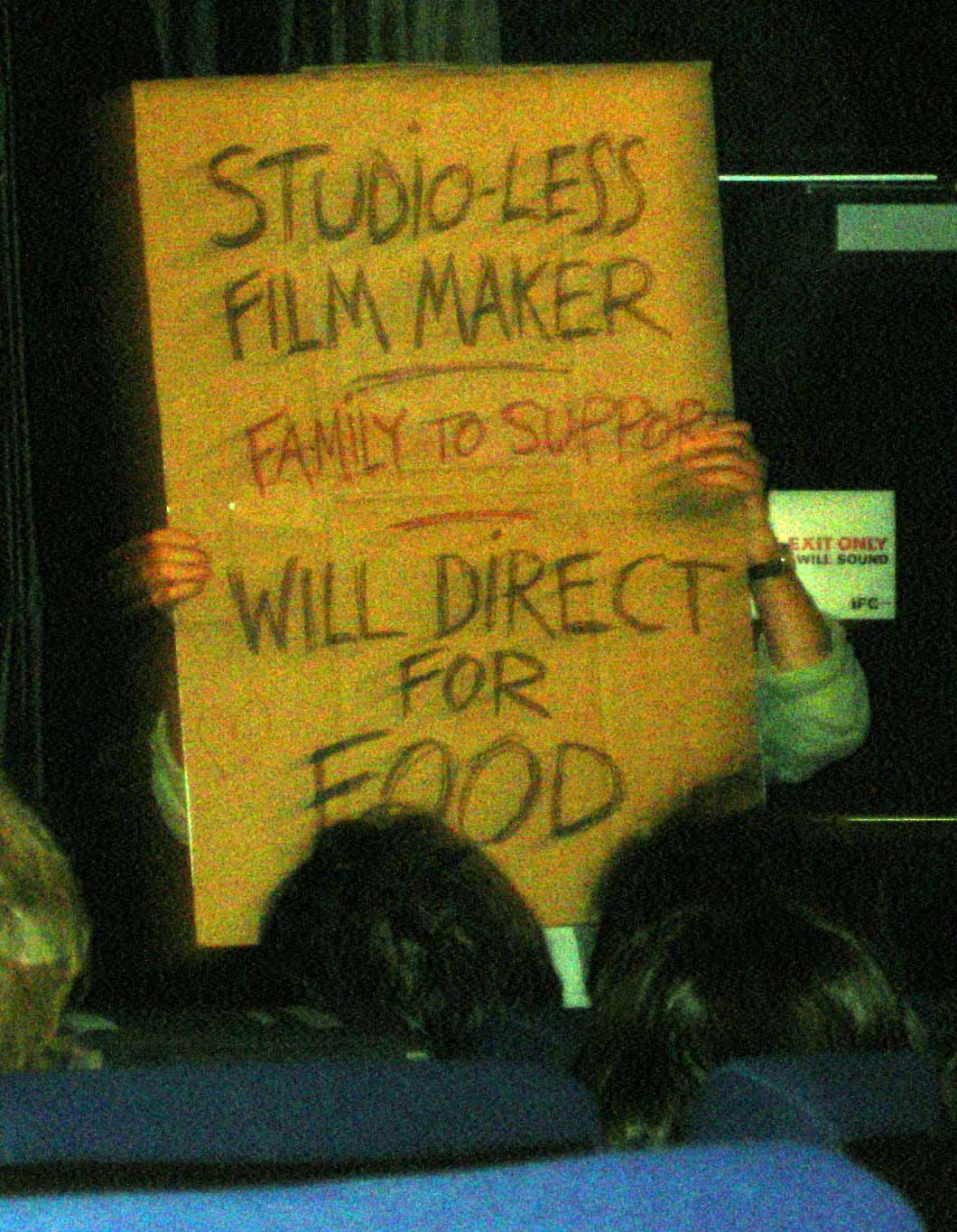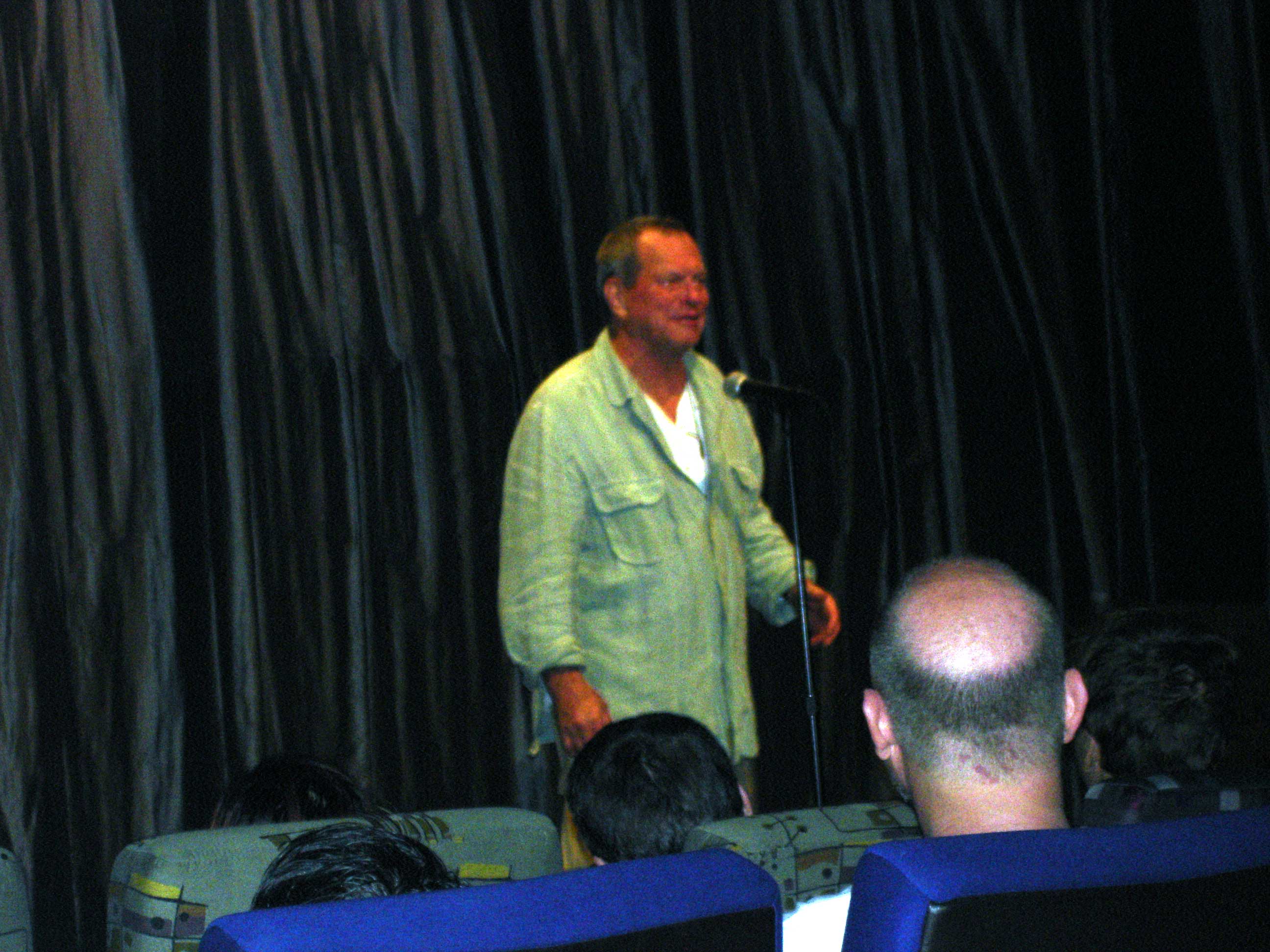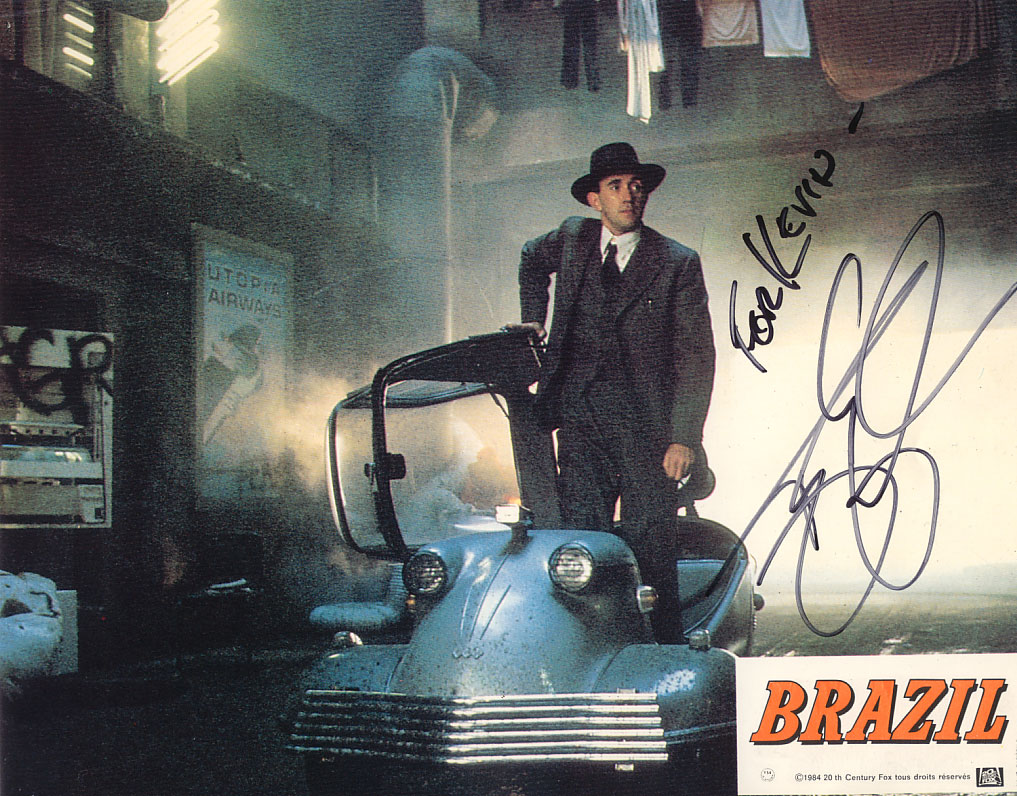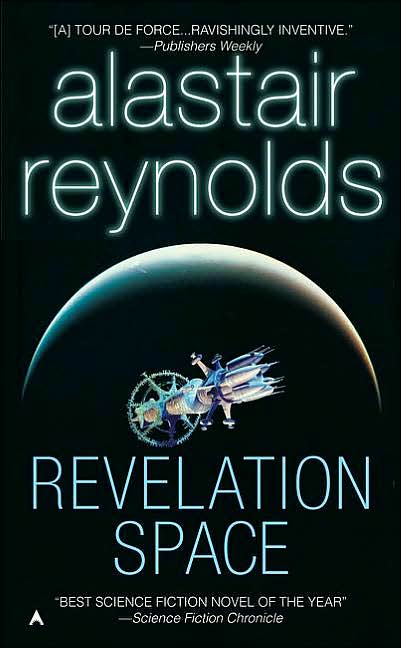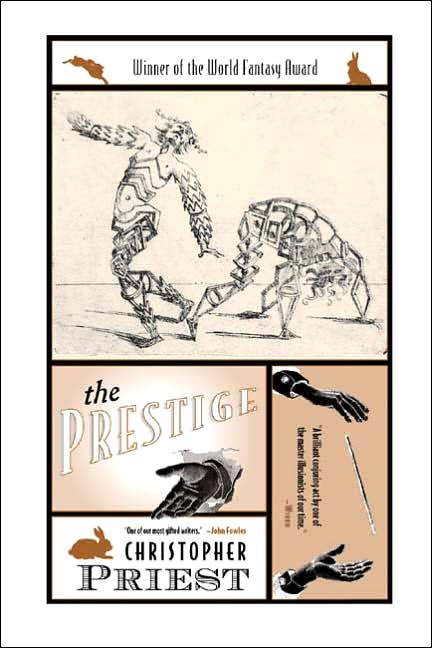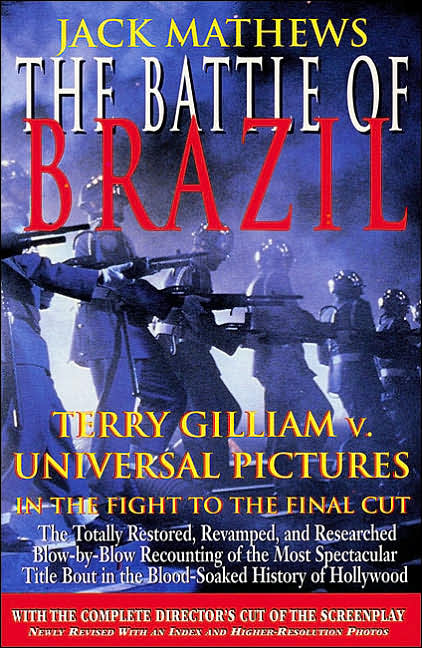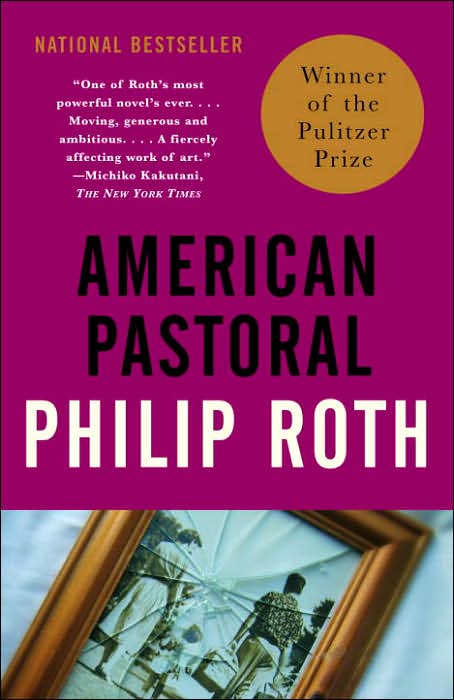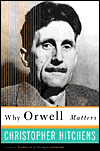In a 4-0 rout, Brazil knocks the US out of the Women’s World Cup in the semifinals. Arg, that’s too bad. Despite the time zone issues, I caught several of the round 1 games (including US-Sweden and US-Nigeria, as well as a few random match-ups like Canada-Ghana and Denmark-NZ) and thought we looked pretty solid, give or take an occasionally lackluster offense. But it sounds like we ran into a brick wall here. At any rate, Brazil will face Germany, who beat Norway 3-0 on Wednesday in the Finals.
Tag: Brazil
Twenty-Five for Fanboys.
EW lists the top 25 sci-fi offerings (in tv and film) of the past twenty-five years. Pretty arbitrary, really, but it includes Brazil (at #6), BSG (at #2 — these two should have switched places), Children of Men (#14), Eternal Sunshine (#17 — same problem), Aliens (#9), The Thing (#10), The X-Files (#4), Galaxy Quest (#24), and Blade Runner (#3), so it’s by no means a bad list. (Both Lost and Heroes should be replaced, however.) Just from what’s missing above, you can probably guess #1…can’t you, Mr. Anderson?
Jack Lint, Everyman?
“Gilliam came nearest to inventing his own country with Brazil (1985), one of the key political films of the late 20th century. Brazil is one of the great political films, an extraordinary mixture of Fellini and Kafka, with a complex force of synthesized images, which belongs to Gilliam alone.” In Slate, critic Clive James assesses Brazil‘s take on torture, and what Michael Palin’s Jack Lint does and doesn’t tell us about the men usually holding the implements.
Terry le Heros.
As longtime readers might know (or might’ve adduced from some of the site banners above), I’ve always been a big Terry Gilliam fan, and will pony up for films considerably worse than The Brothers Grimm to repay the man for making Time Bandits, Fear and Loathing in Las Vegas, and one my all-time favorite movies, Brazil. (In fact, “Ghost in the Machine” is the name of this site partly for the Brazil reference.) So it was a real treat yesterday when I and a friend from high school got to see Terry Gilliam live in the flesh last night at the IFC Center on 4th St. After making the rounds in front of The Daily Show yesterday afternoon, Gilliam showed up as part of IFC’s Movie Night series, in which a director of some repute screens one of his favorite films. (In fact, he showed up with the sign he’d been lugging around outside all day: “STUDIOLESS DIRECTOR — FAMILY TO SUPPORT — WILL DIRECT FOR FOOD”) Apparently, Gilliam had wanted to show One-Eyed Jacks, the 1961 western directed by Marlon Brando, but the Brando estate wouldn’t deliver a print or somesuch.
So, the film we got instead was Jaco von Dormael’s Toto le Heros (Toto the Hero), a bizarre Belgian concoction of 1991 that’s part Prince and the Pauper, part Singing Detective, part Citizen Kane and very Gilliamesque. A movie that’s hard-to-explain but that’s definitely worth renting, Toto follows the story of one Thomas van Haserbroeck (Don’t call him van Chickensoup), an imaginative young boy unsettlingly in love with his sister, a lonely man contemplating an affair with a mystery woman, and a deeply depressed senior citizen looking to exact revenge for a life-long grievance. Y’see, Thomas (or Toto, as he’s called in his dream life, where he’s a film noir gumshoe) insists he remembers being switched with another baby — his wealthy next-door neighbor, Albert Kant — during a fire at the hospital, and therein, in his mind, lies the source of most of his troubles. As the story switches back and forth in time, Toto and Albert’s lives keep butting against each other in strange doppelganger fashion, while old-Thomas enacts a plan to reclaim his stolen life…
After the movie, Gilliam returned to the front for a wide-ranging Q&A session, which involved questions both probing (“Did you borrow from Toto in 12 Monkeys?” [No, don’t think so.]) and peculiar (“Where’d you buy your shoes? Where’s the worst place you ever spent the night?” [Birkenstocks, some backwater hut in India]) Along the way, Gilliam told tales of first meeting the Python guys, photographing Frank Zappa in 1967, choosing his various directors of photography, and, the battle of Brazil notwithstanding, generally enjoying the constraints of studio heads and limited budgets. (They focus him.) Speaking of which, he also said Good Omens still seems to be moving forward, and Quixote may still happen someday. (He also mentioned The Defective Detective briefly, but it seemed in the past tense.) And these days he’s digging the new Dylan album, as well The Arcade Fire’s Funeral and The Flaming Lips’ At War with the Mystics.
At one point, he also said he was considering suing Bush, Cheney, et al for making an unauthorized remake of Brazil. With that in mind, I asked him whether his views on Brazil had changed at all now that we’re kinda living it. (I mean, what with Cheney playing Mr. Helpmann, Canadian citizens getting Buttled, and the Dubya team now fully sanctioning Jack Lints, what’s a good Sam Lowry to do, other than await his turn in the chair or on the waterboard?) He noted that, obviously, Brazil-type stuff was going on around the world at the time (in the Soviet bloc, Argentina, etc.) but that he watched the film the other day (to check out the new Criterion HD-DVD version) and was amazed at both how prescient and topical it was.
Throughout, Gilliam was amazingly friendly and personable, and came across a remarkably humble and down-to-earth guy. He kept taking questions well after the IFC-suit tried to close down the affair, and hung around the nearby cafe afterwards to sign various items. I ended up being the second guy in line, and got him to sign the Brazil still above (one of five I have framed in my hallway.) When he asked me my name for the signature, he lit up, “Kevin! Time Bandits Kevin!” I told him I was right around that age when I first saw Time Bandits, and he’s definitely got a lot to answer for.
L for Lowry.
“Nothing better illustrates the simplism of V for Vendetta, or better highlights the unflattering contrast with Brazil, than V’s motto: ‘There are no coincidences.’ The comic beauty of Brazil’s portrait of totalitarianism is that everything rests on random coincidence, which nudges the bureaucracy into its own blind and murderous momentum: A dead fly falls into a computer printer and — voila — poor law-abiding Buttle is mistaken for dangerous subversive Tuttle.” Slate‘s Matt Feeney compares Brazil and V for Vendetta.
Clearing the Book Bin.
In a perfect world, I’d write up book reviews here on GitM with the consistency and length of my movie posts. (Then again, in a perfect world, I’d also be able to dunk a basketball.) But, time being a factor, here instead are some short thoughts on non-history books recently consumed.
Revelation Space, Alastair Reynolds: “Working alone, living within the cramped confines of the pod, Sylveste spent weeks learning how to jump-start the lighthugger’s crippled repair systems…When the recuperative processes were in swing he was able to sleep, finally — not daring to believe that he would actually succeed. And in those dreams, Sylveste gradually became aware of a momentous, paralysing truth…before he regained consciousness, something had happened. Something had reached into his mind and spoken to him. But the message that was imparted to him was so brutally alien that Sylveste could not put it into human terms. He had stepped into Revelation Space.“
I’d heard a lot of good things from sci-fi aficionados I trust about the Revelation Space arc of Alastair Reynolds, who holds a PhD in astronomy and clearly knows his stuff. In fact, one of the strengths of Revelation is in how Reynolds grounds what amounts to a sci-fi space opera in hard science ideas. For example, I don’t think I’m giving too much away to say that the book offers a hypothetical answer to Fermi’s Paradox, or that Hawking’s singularity theories play a significant role in the denouement. Of course, some scientific quandaries, such as the ability for ships to move at or around lightspeed, are left unexplained (it’s apparently been figured out by a shadowy, mysterious group known as the Conjoiners.) But, even those flights of fancy carry the touch of realism, as indicated by the time disparities throughout the book — Often, a character will get locked away in jail or have some other ugly incident befall him or her, and then fifteen years will pass in the space of a few paragraphs (or at least fifteen years relative to the prisoner — the time is shorter on the ship en route.)
These clever ideas notwithstanding, however, I found Reynolds’ writing style a bit dense and unwieldy at times. All in all, I ended up enjoying Revelation Space, but it was also a bit of a slog. In fact, I ended up putting it down for several weeks. There are four books (and counting) in the series, and I’ve heard they get better as they go along…but still, I’ve been putting off delving into #2, the prequel Chasm City, until I’ve got more time on my hands.
Children of God, Mary Doria Russell: “It was absurd in hindsight — the very idea that a handful of humans might have been able to do everything right the first time. Even the closest of friends can misunderstand one another, he reminded himself. First contact — by definition — takes place in a state of radical ignorance, where nothing is known about the ecology, biology, languages, culture, and economy of the Other. On Rakhat, that ignorance proved catastrophic. You couldn’t have known, Vincenzo Giuliani thought, hearing his own pacing, but remembering Emilio’s. It wasn’t your fault. Tell that to the dead, Emilio would have answered.“
As y’all may or may not remember, I highly recommended Mary Doria Russell’s The Sparrow last fall, and have only now gotten around to reading the sequel, in which both Father Emilio Sandoz, sole survivor of the ill-fated Jesuit expedition, and the planet of Rakhat grapple with the consequences of the abortive, abysmal First Contact described in Book One. An anthropology PhD (I promise, I read sci-fi by non-PhDs too — this back-to-back was a fluke), Russell has constructed a clever and refreshing science fiction tale here that seems very far removed from most standard forays in the genre. I preferred Sparrow to Children — in fact, in some ways I think the resolution of the latter book detracts from the power of the first — but they’re both well worth-reading and readily accessible to people who get easily aggravated by the usual sci-fi literary tropes.
I will admit that at times I felt that Russell’s characters all spoke with the same voice — they all have the same wry intelligence and self-deprecating humor, and they tend to react in similar ways when pushed to the wall. But, it’s a forgivable lapse, and besides, given that this is the type of mistake made by newer authors, the tendency may well be rectified in her newest, just-published book, A Thread of Grace (No more sci-fi for now — Grace is a work of historical fiction set in WWII Italy.)
The Prestige, Christopher Priest: “First let me in a manner of speaking show you my hands, palms forward, fingers splayed, and I will say to you (and mark this well): ‘Every word in this notebook that describes my life and work is true, honestly meant and accurate in detail.’…Already, without writing a falsehood, I have started the deception that is my life. The lie is contained in these words, even in the very first of them. It is the fabric of everything that follows, yet nowhere will it be apparent. I have misdirected you with the talk of truth, objective records and motives. I have omitted the significant information, and now you are looking in the wrong place.”
After finishing up Batman Begins, Memento‘s Chris Nolan will apparently be making this film, and it should be a doozy. Tales of turn-of-the-century prestidigitators have perhaps been somewhat overdone in recent lit — At times, The Prestige reminded me of both Glen David Gold’s Carter Beats the Devil and the first “Houdini” half of Kavalier & Klay. Nevertheless, The Prestige, the sordid tale of two dueling stage magicians and their respective covenants with electrical pioneer Nikola Tesla, is a quick fantasy read that’s well worth picking up. Even if you figure out where it’s all going, and I’d say I guessed most of it about halfway through, the ending still has a Five Star level Twilight Zone-creepiness to it. All in all, with an eerie climax you’re not going to shake off lightly, The Prestige is a grim and captivating conjuration — read it before seeing the movie.
The Battle of Brazil, Jack Mathews: “Gilliam’s Brazil is a cautionary tale about the loss of passion in a bureaucratic society where people passively go along to get along. It’s his metaphor for the lives we now lead, overly dependent as we are on structure, materialism, and dubious technology. There isn’t a futuristic element to it, other than the likelihood that the future holds more of the same. The love story between the daydreaming bureaucrat Sam Lowry and the cynical truck driver Jill Layton is the major sub-text. The dominant theme is that only through fantasy can we escape the reality of our own lives.“
I actually don’t quite agree with Jack Mathew’s take above on the film…there’s a lot more going on in Brazil than just Organization Man angst. [I tossed this out for my college paper almost a decade ago, but at some point I’d like to write a much-longer post around here that does Brazil (and, for that matter, Amadeus, Miller’s Crossing, and several other of my Top Ten films) justice.] At any rate, you can get most of the information in The Battle of Brazil — which chronicles the attempts by Universal flunky Sid Sheinberg to either squash or re-edit the film — out of the companion documentary on the 3-disc Criterion set (which also includes the Sheinberg “Love conquers all” edit.) But, for fans of Terry Gilliam’s magnum opus (as well as people interested in studio realpolitik), there are a lot of fun anecdotes and vignettes to be had — For example, Rupert Everett or Tom Cruise as possible Sam Lowrys, DeNiro’s Method Acting Tuttle to everyone’s annoyance, and Gilliam’s point-for-point evisceration of several negative reviews of the film (including ones by Rex Reed, Roger Ebert, and the inimitable Pauline Kael.) This version of the book also contains the full screenplay (by Gilliam, Tom Stoppard, and Charles McKeown, the latter of whom plays Sam’s office neighbor Harry Lime.) Again, a quick read, and interesting in its own right as a tale of Hollywood inside baseball. But, of course, unlike The Prestige, see the movie before you read the book.
The Shawl, Cynthia Ozick: “She looked into Magda’s face through a gap in the shawl: a squirrel in a nest, safe, no one could reach her inside the little house of the shawl’s windings. The face, very round, a pocket mirror of a face: but it was not Rosa’s bleak complexion, dark like cholera, it was another kind of face altogether, eyes blue as hair, smooth feathers of hair nearly as yellow as the Star sewn into Rosa’s coat. You could think she was one of their babies.“
I’ll be the first to admit that when it comes to evaluating serious and prize-winning short fiction like Cynthia Ozick’s The Shawl, I tend to feel slightly out of my depth. (But being uninformed about matters has never stopped me from commenting before, so why worry about it now?) At any rate, the question of how to address and make sense of insensible atrocities is one pondered by both fiction writers and historians. And, while I was moved and impressed by some of Ozick’s paragraphs or imagery at times, altogether, I don’t think these two stories squared that elusive circle very well.
At the risk of spoiling it for you [Seriously, stop reading if you don’t want to know the end], the very brief first story in The Shawl, set inside a concentration camp, basically involves a mother’s reaction to watching her baby get thrown onto an electric fence. (The longer and better second tale picks up with the same mother, now a semi-sane Holocaust “survivor” in retiree-land Florida, thirty years later.) This first story is obviously shocking and repugnant, and perhaps as a way of approximating a small sliver of the unknowable horror of the Holocaust, it may even be a success. But, to be honest, I found it more exploitative than anything else — the central incident of the tale happens so quickly and with so little context that it reminded me of what David Edelstein (and others) noted of the egregious 21 Grams: “it doesn’t take insight or artistry to shake up an audience with dead kids. It just takes a certain kind of ruthlessness.“
To be fair, perhaps my problems with The Shawl are faults of the genre. After all, if there’s any murdering of innocents to be done in a short story, it has to be done rather quickly, or else we’re getting into novella territory. Still, I found Bao Ninh’s novel The Sorrow of War a much more harrowing and successful survivor’s tale read of late, partly because it reflects at length on the questions of writing and remembering, but also because it had more room to breathe, more lulls between the horrific episodes, and, to my mind, more character development.
American Pastoral, Philip Roth: “He had learned the worst lesson that life can teach — that it makes no sense. And when that happens the happiness is never spontaneous again. It is artificial and, even then, bought at the price of an obstinate estrangement from one and one’s history…He whose natural nobility was to be exactly what he seemed to be has taken in far too much suffering to be naively whole again…Stoically he suppresses his horror. He learns to live behind a mask. A lifetime experiment in endurance. A performance over a ruin. Swede Levov lives a double life.”
A few years ago a good friend of mine let me her copy of Goodbye, Columbus as an introduction to the world of Philip Roth and…well, not to put too fine a point on it, I didn’t like it. (My impressions of the book are blurry now, but I remember thinking that not only could I not empathize with the main character, I actively disliked him, from his relishing his 1-on-1 basketball victories over his girlfriend’s little sister to his endless passive-aggressive pushing on the diaphragm issue. In retrospect, I guess that was probably the point.) So, when another good friend offered me her copy of American Pastoral, I was mildly hesitant.
Yet, I found Swede Levov’s fall from American grace vastly preferable to my first Roth experience, so much so that I aim to throw a few more of his books in the hopper at some point in the near future. (Looking back, it was probably a bad call to judge a writer of Roth’s stature and prolificness by only his first work anyway, however well-reviewed.) At times, I did think the “Americanness” aspect of the Swede’s arc was a tad overdone — for example, in the Johnny Appleseed segues, or the hinge point of the story being 1968. And perhaps the symbolism was occasionally just a little too cute (e.g. Miss New Jersey becoming a breeder of cows, or the dinner party incident that closes the book.) But, all in all, Pastoral turned out to be quite a powerful treatise on the charred smell emanating from all too many postwar American dreams, as well as a haunting case study of one man trying to keep it together once the wheels come off. (By the way, I’m open to suggestions for the next stop on the Roth train. Portnoy? I Married a Communist?)
Why Orwell Matters, Christopher Hitchens: “The three great subjects of the twentieth century were imperialism, fascism and Stalinism…Most of the intellectual class were fatally compromised by accomodation with one or other of these man-made structures of inhumanity, and some by more than one…[But after his experience as a budding imperialist functionary in India] Orwell was in a stronger position to feel viscerally as well as intellectually about the modernist empires of Nazism and Stalinism. Among many other things, of which an educated sympathy for victims and especially racial victims was only one, he had grown sensitive to intellectual hypocrisy and was well-tuned to pick up the invariably creepy noises which it gives off. He was already an old India hand, in other words, when it came to detecting corrupt or euphemistic excuses for undeserved and unchecked power.“
I’m sure I’m not the only person out there who looks at Christopher Hitchens these days and laments a great writer and once-formidable man of the Left now — seemingly irrevocably — gone to seed. Still, Orwell being high in my personal pantheon of writers, I thought I’d give his extended essay Why Orwell Matters a look-see. The result is intriguing not only for what it tells us about Orwell, but also in understanding and humanizing this most recent incarnation of Hitchens. Throughout the book, Hitchens applauds Orwell’s enviable foresight and his “power of facing” unpleasant truths so often obscured to others by ideology or wishful thinking. As the passage above suggests, with the exception of severely understating the future role of the US in world affairs (and his occasional and unfortunate lapses into homophobia), Hitchens argues, Orwell got all the big questions of the 20th century right. He anticipated the demise of imperialism and — unlike many of his contemporaries on the Left — was as stringent an opponent of Stalinist totalitarianism as he was of Nazism.
Hitchens is correct in noting all of these remarkable insights and legacies of our man Orwell. (As an aside, Hitchens’ theory that Orwell could probably have gotten lifesaving treatment for his tuberculosis here in America is really just too depressing to contemplate.) Still, I don’t think it’s going too far to suggest that Hitchens is also trying to use Orwell as a paragon of independent thinking in order to justify his own recent cheerleading for the Bush administration and the war in Iraq.
I don’t know how Orwell would come down on the Iraq war. Who can know for sure? On one hand, as Hitchens would immediately point out, Orwell was no friend to tyrants. He put his own life on the line to defend Republican Spain, and — like most clear-headed people — wouldn’t shed a tear to see a two-bit sadistic despot like Saddam dispatched to the dustbin of history. On the other hand, Orwell clearly had a well-developed suspicion of imperialist enterprises, particularly those cloaked in the language of freedom and good intentions. If nothing else, I feel pretty confident Orwell would have lambasted the corruption of political rhetoric — and outright lies — that characterized our entry into this current conflict. I’m sure Hitchens is right to suggest that Orwell would rally against the inhuman ideology of terrorist fundamentalism, as he did against the nefarious -isms of his day. But that doesn’t mean Orwell — or Hitchens, for that matter — should be so sanguine in backing our current policy in Iraq. One does not necessarily flow from the other.
Dark City.

Bleak Week 2003 continued yesterday, when I finally got around to seeing the much-praised City of God. And while this fierce, hyperkinetic Brazilian film has some serious problems, it’s a much better night at the movies than Sunday’s foray into 21 Grams.
From its very first scenes, in which our young photographer-protagonist finds himself trapped in the midst of a Mexican (ok, Brazilian) standoff between a street gang and the corrupt cops, City of God makes no bones about its debts to Scorsese and Tarantino. In fact, for much of the film, I was reminded of Guy Ritchie’s Lock, Stock, and Two Smoking Barrels, which brought to London much of the same snappy, experimental camerawork, “funny” gunplay, and street gangster-chic that’s on display here in Rio. But that metaphor only goes so far — this increasingly dark film ultimately feels very different than the breezy Lock Stock. In fact, while Scorsese, Tarantino, and Ritchie gangsters all generally find themselves on the wrong side of the law as a calling, the Brazilian youths here are born into it — crime, violence, and murder are an inescapable part of the Cidade de Deus.
Or is it? I know this movie is based on a novel based on real events, but at a certain point, right after the strobelight-marked murder of one of the film’s most likable characters, City of God just gets lost in its own cycle of violence. When L’il Ze, the cruelest hoodlum we meet on our travels, brutally rapes the girlfriend of Knockout Ned (we never see her again — she’s a plot point, not a character), a gang war ensues that drastically escalates the already considerable levels of death and carnage the audience has to deal with. In this final third, the film derails…it’s just too much.(Ken Turan aptly summed it up as “overkill.”) One goes from avidly following the travails of individual characters to watching most or all of them go down in a hail of gunfire.
Like I said, I know that much of this tale is based on a real gang war, and that the ridiculously high body count at the end of the film may have a solid grounding in fact. But at times City of God wants to have it both ways. When innocent bystanders are mowed down or child gangsters are forced to make extremely grisly life-and-death choices, we’re shocked sullen by the events depicted here. But when L’il Ze blows away his stooge Tuba in a fit of frustration, it’s a sight gag.
In sum, with swooping camerawork, great performances across the board, and a well-crafted narrative, City of God bridges the gap between Tarantino-cool gangsterism and shocking acts of violence reasonably well for its first two-thirds. Alas, it falters in the final act, and I found myself spending the last thirty-five minutes of a movie I’d quite enjoyed up til then keeping my head down and waiting for the last reports of gunfire to die away. Well worth seeing if you’re a fan of the hyperkinetic gangster genre, but ultimately City of God just can’t quite close the deal.

The Gift of Music.
Want to send a singing telegram? Let them sing it for you, via Absolute Piffle. Mother, I regret I’m unable to come to your parrrrty…
Majority Report.
Saw Minority Report over the weekend and quite enjoyed it, although [Spoilers:] the last twenty minutes or so almost completely derailed the film (a la the Saving Private Ryan bookends.) Then again, I liked it better once I read the AICN talkback hypothesis that, as in Terry Gilliam’s Brazil, everything that happens after Anderton is “halo’ed” is his dream sequence, as foreshadowed by creepy-as-all-git-out Tim Blake Nelson’s soliloquy to that effect. Since that’s the exact scene after which the film began to smell, I much prefer this alternative. At any rate, I’m going to have to view it again to see if it holds up. I hope so.

